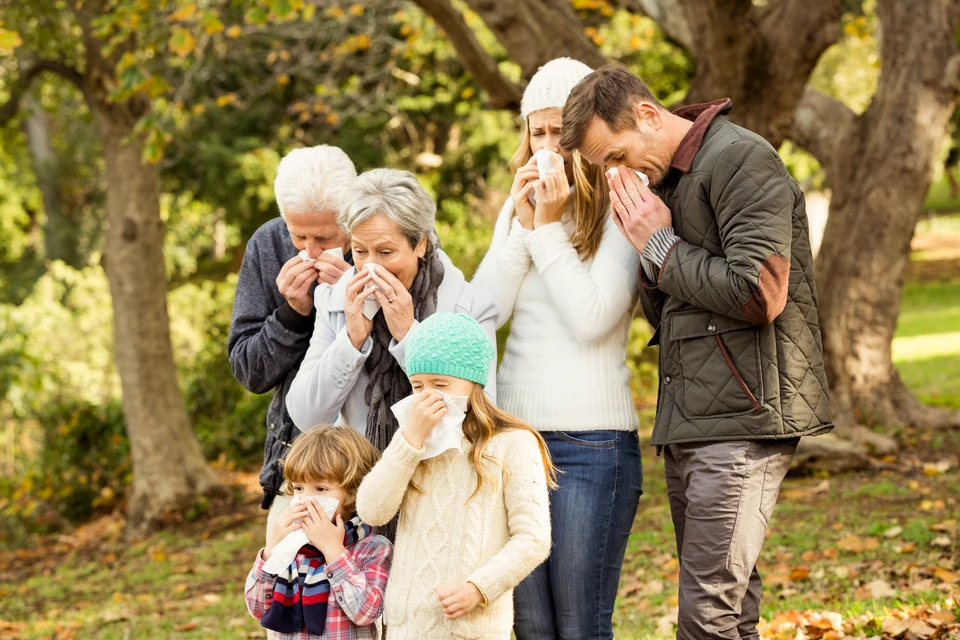
The season of respiratory diseases traditionally begins in autumn
Photo: Shutterstock
AN EARLY EPID SEASON IS EXPECTED
The school year has begun – and with it comes concern for the health of our children. Traditionally, September marks the start of the season of respiratory diseases. People get sick both in kindergartens and in schools; sometimes our students don’t even have time to make it to the autumn holidays: they get sick, stay home and miss classes. But not only children, but also adults get sick. After all, schoolchildren and preschool children bring viruses home, where they pass them on to their parents, who then take them to their offices…
Experts are already making predictions about what the flu and cold season 2023–2024 will be like. And the forecasts are quite alarming.
An early start to the respiratory season is expected in the fall of 2023. The flu will be especially dangerous this year. During the COVID-19 pandemic, the activity of influenza viruses decreased markedly, but now they are gaining strength again.
WHO IS AT RISK?
The most vulnerable to the same flu are children. They, especially those under 6 years of age, do not yet have what is called prepared immunity. When it is formed, viruses become the key factors that allow the creation of acquired immunity in addition to innate immunity.
– Unlike an adult, a child’s body is not familiar with most respiratory viruses. And therefore the child has the right to get sick, training his immunity, – explains Doctor of Medical Sciences, Professor of the Department of Infectious Diseases, Professor of the Department of Children’s Infectious Diseases of the Federal State Budgetary Educational Institution of Further Professional Education of the Russian Medical Academy of Postgraduate Education of the Ministry of Health of the Russian Federation, excellent student of healthcare of the Russian Federation, member of the European Association of Pediatricians-Infectious Diseases (ESPID), member of the National Scientific Society of Infectious Diseases (NSSI) Tatiana Chebotareva.
The second main risk group is people over 65 years of age. Here we are talking about the phenomenon of a dormant immune response. That is, older people or people with concomitant pathologies or chronic diseases react differently to the infectious process. But often it is grandparents who communicate most with their grandchildren, school students or kindergarteners.
Whether we get sick depends on the current state of the immune system and innate immune factors. For example, if interferon is produced quickly and immediately in high concentration, then, in principle, such people do not get sick with the same flu or get sick only mildly. This is something that we inherited from our parents, but there are not very many such people.
And those who do not have this ability get sick with more severe symptoms. Those who produce interferon in low concentrations become seriously ill all the time. And their risk of severe infections increases significantly.
METHODS OF PROTECTION
What to do to avoid getting sick? Of course, follow preventive measures: first of all, we are talking about vaccination. You can already get flu vaccinations; they are free in our country. Mandatory vaccination against COVID-19 has been cancelled, but it is still worth getting vaccinated against it. People with weakened immune systems, those who are at risk, who are protecting themselves and their families, should definitely think about this. The introduction of vaccines is the most effective preventive measure available throughout the world.
But do not forget about other methods of protection: dress according to the weather, wear a medical mask in public places, use an antiseptic and wash your hands thoroughly, rinse your nose with saline solutions, apply oxolinic ointment to the nasal mucosa, which prevents viruses from entering the body.
IF YOU STILL GET ILL
If symptoms appear—fever, runny nose, sore throat, cough—the most important thing is that the sick person should stay home. After all, in this state a person is a potential source of infection.
You can take antiviral drugs, for example, Ergoferon.
– In my practice, I try to give preference to antiviral drugs with proven effectiveness and safety, – tells Tatiana Chebotareva. – And at the same time, capable of providing comprehensive treatment of the disease, that is, those that have the maximum possible set of properties and effects necessary for successful treatment, and are able to cope with both the cause and symptoms of ARVI.
The next important point: you need to call a doctor, and he will decide what steps to take and how exactly to treat. Usually, at temperatures greater than 38.5, antipyretic drugs and drinking plenty of fluids are used.
These are the criteria for the so-called universal approach.